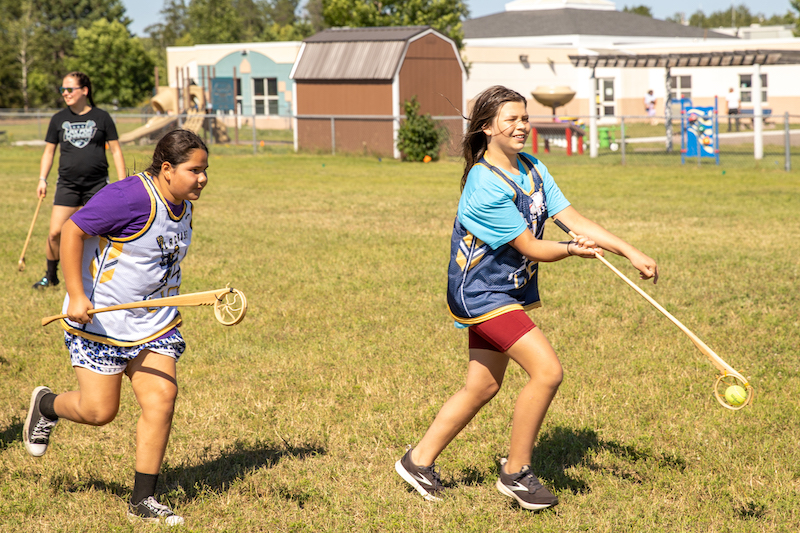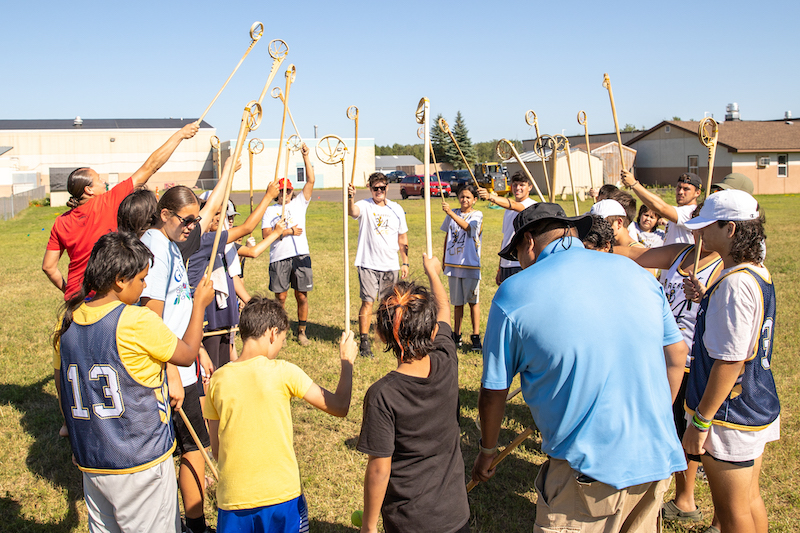
Homegrown Lacrosse Connecting Native Youth with Culture & Community
Sport Supporting Indigenous Communities
August 25, 2023
Culminating our series on sport for development organizations within our network that serve Indigenous communities, today we’re spotlighting the Twin Cities' (Minneapolis and St. Paul) Homegrown Lacrosse in the United States. We spoke to Rory Taylor, Executive Director of the organization's Indigenous Lacrosse Alliance, about their work to positively impact local Indigenous youth.
The Minneapolis-Saint Paul metropolitan area is home to one of the largest and most tribally diverse urban American Indian populations, totaling over 35,000. The size of the indigenous population there boomed as a result of the 1956 Indian Relocation Act. The native community of Minneapolis is comprised of many nations, the largest being the Dakhóta (Dakota) and the Anishinaabeg (Ojibwe). Around 45% of Minneapolis’ American Indian population lives in poverty and due to the historical American Indian Movement, the community has been subject to racism, police harassment, substandard housing and poverty.
Lacrosse was started by Native Americans who played variations of the game as early as the 12th century. Founded in 2003, Homegrown Lacrosse works to create positive change in the lives of local youth through lacrosse, many of whom have local Indigenous ties and backgrounds. It harnesses the sport to inspire and empower young people to excel in life through a variety of programs designed to develop character, build self-confidence and instill a sense of community. Each works to provide valuable life and perspective-changing experiences for thousands of young people and provides support to over 120 community lacrosse organizations each year from youth to post-collegiate boys, girls, men and women.
The non-profit offers a variety of programs including overnight summer camps, year-round skill training, tournaments, special events and in-school and college physical education programs. One of its major additions has been the Indigenous Lacrosse Alliance (ILA), which was developed in 2022 and works to provide opportunities for Indigenous youth to experience traditional sports, including lacrosse and engage in activities centered on holistic well-being and traditional culture.

Native-led ILA works alongside Indigenous peoples and organizations to revitalize lacrosse in tribal and urban Indian communities. It has a mission to expand access and opportunity for Indigenous communities to play lacrosse and improve the health and well-being of Indigenous youth. Its Lax-4-Life Summer Camp was developed in 2009 to promote wellness among Indigenous youth. Campers visit the Fon du Lac reservation and Brookston Community Center engaging in sessions designed to promote physical fitness, nutrition and social and emotional health in addition to learning lacrosse skills and concepts. It brings together over 50 Indigenous youth from around 12 Indigenous groups across the Upper Midwest to learn lacrosse and engage in topics like suicide prevention and mindfulness. It also provides administrative support and coach training for tribes starting their own teams. This year, the non-profit plan to hold two camps across grades 6-10.
“The ILA grew out of a community conversation centered on how to support Indigenous youth across the Upper Midwest. Our programs draw from communities across Minnesota and increasingly from across our region and nationally. Our focus is on supporting the needs of these urban Indigenous and tribal communities and working to build capacity towards their efforts to grow the game in whatever we can,” explained Taylor who shared that the organization celebrated August 9's World Indigenous Day at Lax-4-Life Summer Camp.
He explains that the challenges facing Indigenous youth in the region are a lack of out-of-school time, mental health and physical health. Recognizing this, the organization’s programming is a mixture of sports, skills training, physical education programs and several other “Grow the Game” initiatives including training of community leaders, coaches, and referees. At the center of this is lacrosse, a game played historically by Indigenous communities across North America.

“[Lacrosse] is part of larger cultural revitalization efforts centered on Indigenous ways of knowing, doing and being. The game is an opportunity for youth to be grounded in their families, communities and nations. More than anything else, it is an opportunity for youth to recognize that they can provide the solutions to the problems they see in their daily lives – it doesn’t take an outside answer or salve, but rather we use what we learn along the way and combine it with our origins to move confidently into our collective future.”
Believing that youth play an integral role in the development and sustainability of communities across the world, the non-profit uses lacrosse to develop local young people. It helps them feel more connected to peers in their communities, regionally, nationally and internationally as well as more connected intergenerationally through elders. It also helps them feel connected to the histories and cultures that they come from. “These key points of emphasis create the catalytic environment for youth to vision their future both as individuals and as a collective. In doing so, we believe that we helping to build healthier families, communities, and nations.”
Homegrown Lacrosse is entering the third year of its five-year strategic plan and is focused on developing a sustainable financial and organizational base to grow the ILA and its programming for Indigenous young people.